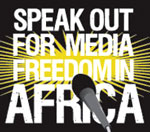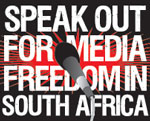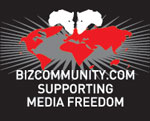
Top stories






More news


Marketing & Media
Ads are coming to AI. Does that really have to be such a bad thing?















"The question I always ask is that, when you have the right of access to information entrenched in the Constitution, do you need a legislation called right of access to information to make it work?" Nigeria's Maxwell Kadiri, of the Open Society Justice Initiative's Africa programme, said.
Kadiri, who spoke about the West African and Nigerian experience, revealed that numerous pieces of legislation on the right of access to information in many countries in West Africa have been stored in government offices for the past seven or eight years, still awaiting the green light from governments to be debated at public hearings.
Hampering the good use
It is understood that the 'arrogant' attitude of government officials in many parts of Africa is hampering the good use of the right of access to information, which is seen by many politicians as an 'excuse channel' for the media to undermine governments and 'prosecute' politicians.
South Africa, which a few years ago was seen as a model of democracy and freedom of expression in Africa, is on the verge of losing that status as it prepares to enact what critics called one of the most bizarre and autocratic legislations in post-apartheid. SA's controversial Protection of Information Bill seeks to classify every piece of information deemed by the state as 'sensitive' and 'dangerous' for the country's national security.
Speaking about the SA experience, Mail & Guardian editor-in-chief Nic Dawes said the discussion of the information bill is far from over, and its implications will be felt far beyond Johannesburg.
Political interference plays a central role
Gary Dickson, Canada's information and privacy commissioner, admitted that political interference plays a central role in the refusal of many governments, including Canada, to supply information to the public, including the media. "Information delayed is information denied," Dickson said, adding that some governments have the problem of poor record-keeping of archives.
Most African states are signatory of the Article 19 of the African Charter which, among others, says that every citizen has the right of access of information and freedom of expression, but critics wonder why very few of them actually practice what the article preaches.
The media is a critical partner of the African Union (AU) because there are a lot of bad things that are reported on and good things that are reported on, so we are looking to create a balance about that, said Zimbabwe's Wynne Musabayana, AU Commission's deputy head of information and communication.
Issues affecting the media in Africa
Musabayana, who is based in Addis-Ababa, Ethiopia's headquarters of the AU, also said another problem the AU is looking at is various issues affecting the media in Africa. "We are aware of the high number of African journalists that continue to be harassed, killed, jailed and arrested by government and non-government actors.
"We are dismayed by the horrendous actions of violence reporters go through, and the number of journalists killed and jailed around Africa," she said.
"Lack of training, lack of basic equipment and low salaries also compromise the career of journalists, which we believe are negatively impacting to the quality of credible and independent reporting," she said, adding that the commission encourages African journalists to also focus on issues other than peace and security.

Last updated at 11.04 on 16 March 2011.
